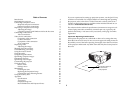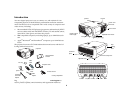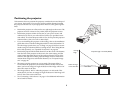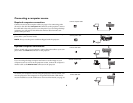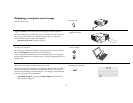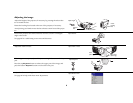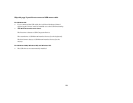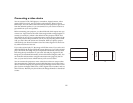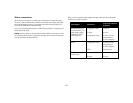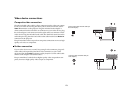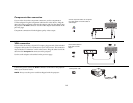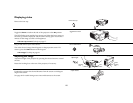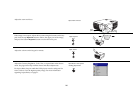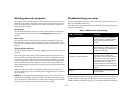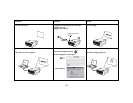
11
Connecting a video device
You can connect VCRs, DVD players, camcorders, digital cameras, video
games, HDTV receivers, and TV tuners to the projector. There is also an
audio input. You can connect the audio directly to the projector to get sound
from the onboard speaker, or you can connect it to your stereo’s receiver to
get sound from your own speakers.
Before connecting your projector, you should decide which aspect ratio you
want to use. Aspect ratio is the ratio of the image width to image height. TV
screens are usually 4:3, which is the default for this projector. HDTV and
most DVDs are 16:9. If you’re projecting onto a screen, the size/shape of the
screen may answer this question for you. If you are projecting onto a blank
wall, you don’t have the screen size restriction. What you plan to project
will also help you choose between 4:3 and 16:9. Most regular TV shows are
4:3, while most movies are 16:9.
If you select 4:3 and play TV, the image will fill the screen. If you select 16:9
and play HDTV, the image will fill the screen. However, if you select 4:3 and
play a 16:9 DVD, the image may be compressed horizontally or have black
bars along the top and bottom. If you select 16:9 and play regular TV, the
image may be stretched horizontally or have black bars along the sides. You
can make this selection later using the onscreen menus (page 30), but for
now you just need to know which format you’ll use most often.
You can connect the projector to most video devices that can output video.
You cannot directly connect the coaxial cable that enters your house from a
cable or satellite company, the signal must pass through a tuner first. Exam-
ples of tuners are digital cable boxes, VCRs, digital video recorders, and sat-
ellite TV boxes. Basically, any device that can change channels is considered
a tuner.
4
16:9 image in a 4:3 space
16
9
4:3 ima ge in a
3
16:9 space
black bars
black bars
black bars
black bars



